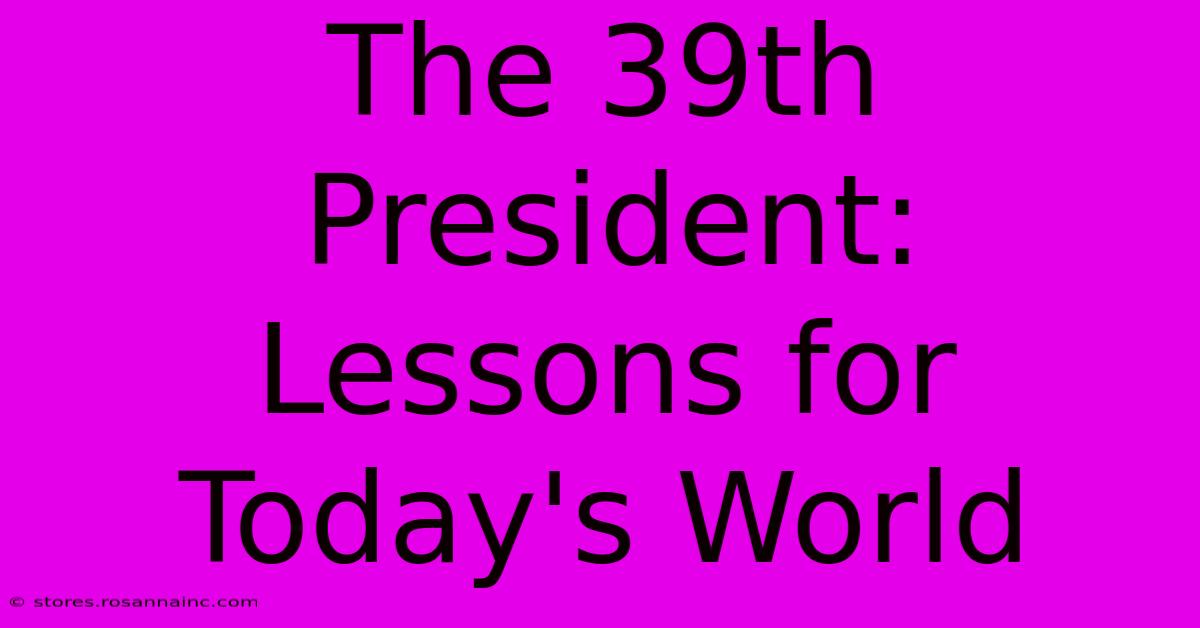The 39th President: Lessons For Today's World

Table of Contents
The 39th President: Lessons for Today's World
Jimmy Carter's presidency, though just one term, left an indelible mark on American politics and continues to resonate in today's complex world. His legacy, often debated, offers valuable lessons in leadership, diplomacy, and the enduring power of principled action. This article delves into key aspects of the Carter administration and explores their relevance to contemporary challenges.
A President Defined by Character
Carter, a peanut farmer turned governor, entered the White House with an outsider's perspective and a commitment to honesty and transparency. This integrity, often seen as a weakness in the cutthroat world of Washington, formed the bedrock of his presidency. His emphasis on human rights in foreign policy, a stark contrast to the realpolitik of previous administrations, while sometimes criticized for its naivety, fundamentally shifted the moral compass of American foreign engagement. Today, in a world grappling with authoritarianism and human rights abuses, Carter's unwavering focus on these principles serves as a powerful reminder of the importance of moral leadership on the global stage.
The Importance of Ethical Leadership
Carter's commitment to ethical leadership stands in contrast to the often-cynical nature of modern politics. His administration prioritized transparency and accountability, attempting to foster a culture of trust between the government and the people. In a time of political polarization and declining public trust, this aspect of his presidency is particularly relevant. His example underscores the need for leaders to prioritize integrity, even when it's politically challenging.
Foreign Policy and the Carter Doctrine
Carter's foreign policy was defined by a commitment to peace and human rights. He brokered the Camp David Accords, a landmark achievement in Middle East diplomacy, demonstrating his skill in conflict resolution. However, the Iran hostage crisis cast a long shadow over his presidency, highlighting the complexities of international relations and the limitations of even the most well-intentioned diplomacy. The Carter Doctrine, which pledged to protect the Persian Gulf region, became a cornerstone of US foreign policy for decades to come, highlighting his foresight in recognizing the strategic importance of this volatile area. This proactive approach to foreign policy, balancing idealism with pragmatism, provides valuable insights for navigating the intricate geopolitical landscape of the 21st century.
Navigating the Complexities of Global Relations
The challenges Carter faced in foreign policy – from the Iranian Revolution to the Soviet invasion of Afghanistan – resonate strongly with the international crises of today. His experiences offer crucial lessons in navigating complex geopolitical situations, emphasizing the need for strategic patience, a nuanced understanding of cultural contexts, and a willingness to engage in both hard and soft power.
Domestic Policy and Economic Challenges
Carter inherited a nation facing economic turmoil, including high inflation and energy crises. His attempts to address these challenges, though not always successful, were marked by a commitment to long-term solutions. His emphasis on energy conservation and the development of alternative energy sources, while criticized at the time, is now considered remarkably prescient in light of the current climate crisis. This focus on sustainability and responsible resource management offers important lessons for contemporary policymakers struggling to balance economic growth with environmental protection.
Lessons in Economic Stewardship
The economic challenges Carter faced, and his responses to them, provide a valuable case study for today's leaders. His administration's efforts to address inflation and energy independence, though not without their shortcomings, highlight the importance of long-term planning and strategic investments in crucial sectors. His commitment to addressing fundamental economic issues offers a powerful contrast to short-term political solutions that often fail to address underlying problems.
A Legacy of Service
After leaving the White House, Jimmy Carter embarked on a remarkable career of public service through the Carter Center, focusing on global health, human rights, and conflict resolution. This post-presidency dedication to humanitarian causes solidifies his legacy as a man deeply committed to improving the world. His example serves as a powerful reminder that leadership is not confined to the halls of power and that lasting impact can be achieved through sustained commitment to service.
In conclusion, the legacy of Jimmy Carter, the 39th President of the United States, offers a wealth of lessons for today's world. His commitment to integrity, his nuanced approach to foreign policy, and his focus on long-term solutions to domestic challenges provide valuable insights for leaders grappling with the complex issues of the 21st century. His post-presidency work further underscores the importance of sustained commitment to service and the enduring power of principled action. Studying his presidency offers a unique opportunity to understand the challenges of leadership and to learn from both successes and failures in navigating a rapidly changing world.

Thank you for visiting our website wich cover about The 39th President: Lessons For Today's World. We hope the information provided has been useful to you. Feel free to contact us if you have any questions or need further assistance. See you next time and dont miss to bookmark.
Featured Posts
-
Artistik Yuezme Olimpiyat Hayallerini Gerceklestirmenin Yolu
Feb 10, 2025
-
Deces Kaplan Fugain Confirme
Feb 10, 2025
-
Is Cook County Clerk Karen Yarbrough Making Your Life Easier
Feb 10, 2025
-
5 Reasons Why Roseland Nj Is The Place To Be
Feb 10, 2025
-
Totenkopfs Enigma Exploring The 3rd Ss Panzer Divisions Role In Wwii
Feb 10, 2025
